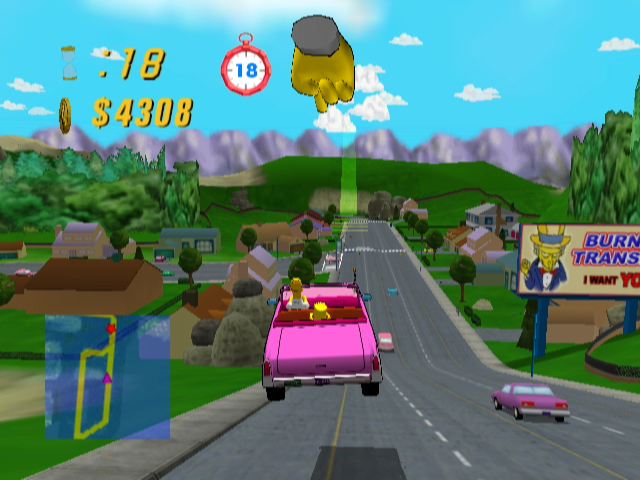
Image courtesy of Moby Games
Like Plato from Socrates, like Elvis from Chuck Berry, like Family Guy from The Simpsons, copying has been a staple of our creative force since the beginnings of human history
It should be no surprise that video games fall under this phenomenon, even taxi-style delivery games, or as the always clairvoyant Wikipedia puts it, the “Vehicular Combat” genre. Crazy Taxi, perhaps obviously, is the OG as far these kinds of games though, but it’s evolved into a cosmos of games in the Mario Kart franchise. Many of these games lack a central plot or any profound meaning, which is fine, and probably part of the reason they’re so great to play. I’m willing to bet a large portion of my generation has a collective memory of getting together with friends and family to play Mario Kart, ultimately resulting in thrown fists.
For all of Mario Kart’s pluses, the real gem of the bunch is The Simpsons: Road Rage, a game so truly terrible and vestigial that the creators of Crazy Taxi sued and GameSpot declared: “Ultimately, the only saving grace Road Rage has is that it’s a Simpsons game.”
I’m fairly certain I bought this game for that exact reason, too. It’s just more Simpsons-themed content to absorb. But, like a lot of the episodes, this game has a surprisingly complex narrative dabbling in public transit and municipal politics. The eternal cultural goldmine.
According to simpsons.wikia.com, Springfield’s public transit consists of the defunct subway system, a couple of bus routes, and the glorious Monorail.
Like Lisa in “Marge vs. The Monorail,” I’m sure many of you would “like to ask you why we should build a mass transit system in a small town with a centralized population.” Granted, It’s obviously built to serve more of a narrative purpose than an actual public need, but Springfield public transit plays a unique role in the political satire of Road Rage.
The town plutocrat, Mr. Burns, privatizes all of the public transit in the city, primarily manifesting itself in “Burns Atomic Megabuses.” In the game’s intro, we watch a newsreel of the unveiling, in which Hans Moleman says “Please kill me” as the bus radiates him while Mayor Quimby – our true villain – watches Moleman became irradiated by the bus.
Moved by the footage, Lisa bemoans the bus’s threat to public health, and Homer begins hiring himself out as an additional privatized transit service. Homer, his family and a variety of Springfield citizens can eventually be unlocked.
It’s implied that Homer’s taxi service (Uber and Lyft stole everything) is used to rake in funds to buy back the original public transit from Burns. The situation is necessarily goofy to fit with the show’s brand, but the storyline takes a turn to the tragic and dystopian upon closer inspection.
Playing Road Rage with @MotherEarth321 and just had a revelation: The Simpsons invented Uber.
— 🌻Denise and Karma🌻 (@Simpsonology) April 24, 2016
In order to get their good old public transit back, Springfielders have to pay other Springfielders to drive them around – it’s a charity drive. Further incentivized to destroy their own city’s infrastructure, we can only play on in horror as the incompetence of local government that the show has so fondly poked at turns sour, leaving the citizens alone in their pursuit for economic, environmental and social justice.
The dystopia of the situation is at first glance mindboggling – ruthless privatization of public transit by power-hungry megalomaniacs, collaboration by foolish neoliberal mayors believing that the alternative energy found in nuclear is beneficial. What Quimby doesn’t realize is that this takes the public transit out of the hands of the people – a neoliberal nightmare of dramatic expense, privatization of public services, and governmental incompetence.
When it comes down to it, we see an anti-populist agenda – something relevant in the early Bush era when the game came out, and something relevant today. What happens when a city is sold out by its own elected government? Services and programs become privatized for the worse, leaving an (unfortunately) oafish citizenry to fend for itself.
If you gather one million dollars in your travels to buy off Burns, no revolution occurs. He takes your money and the original public transit comes back. But the powers that be remain.
It’s a surprisingly dark reminder that the only worthwhile pursuits come directly from motivated citizens, whether it be doughy yellow men, Kwik-e-Mart owners, or even you and me.